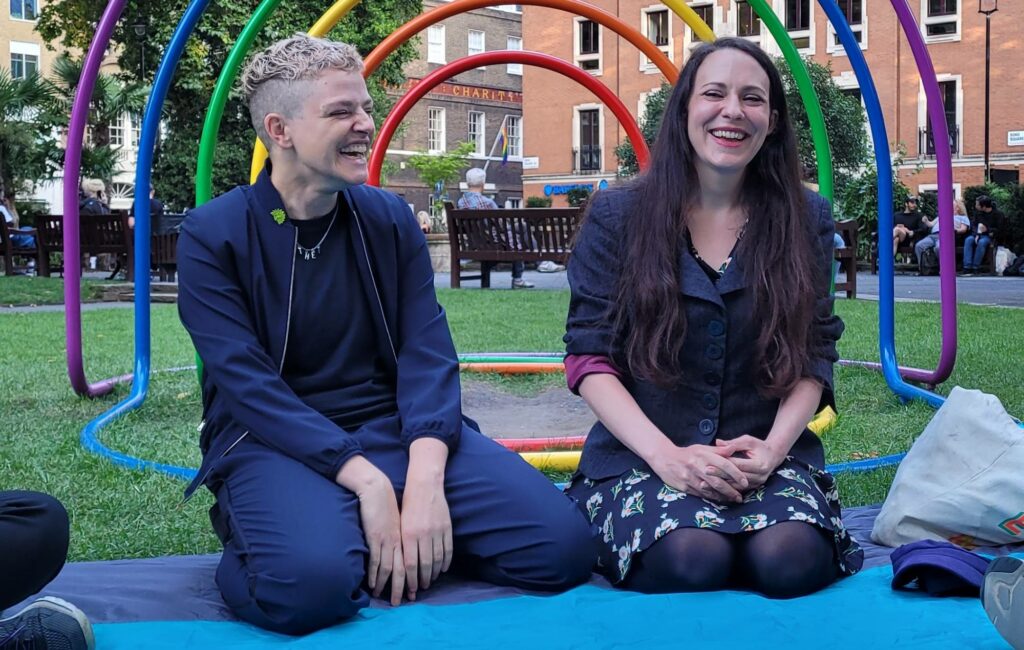No time for another COP-Out, says Tamsin Omond
Long-term goals fail to address the urgency of the climate crisis, says the Green Party's Tamsin Omond. Here, they outline the Party’s nine policy changes that can effect immediate beneficial change
By Tamsin Omond

More than ever before, we’re paying attention to a climate and ecological emergency that is gathering pace around us. It is, after all, becoming hard to ignore. The real-life impacts of climate change are being felt now: floods, wildfires, extreme and devastating weather events are happening all the time, on every continent, affecting more and more of us.
Global protest movements such as Extinction Rebellion have increased our awareness, international science is telling us that it is code red for humanity and the prophetic voice of Greta Thunberg has articulated the urgency with which governments must act.
In a context as grave as this, what should our Government do – especially this year, when the UK hosts one of the most important meetings on climate change ever? COP26 (short for Conference of Parties, with the latter being government representatives from every nation) takes place in Glasgow in November. And the success of this international, top-down conversation about how governments are going to work together to respond to the climate crisis relies on the host nation, the UK, showing powerful leadership.
Right now, we’re failing at that. The Government’s record on the environment is embarrassing. We are planning a £27bn road-building programme, the possibility of new oil exploration in the North Atlantic oil field at Cambo, and we have shamefully withdrawn from our international aid commitments.
Instead of rising to this moment and to the pivotal role we might play, the UK is proving a colossal failure at climate leadership in this all-important year.
Held under the United Nations Framework Convention on Climate Change at annual gatherings, conversations at COP26 have been taking place every year since 1995. Aiming to create international legislation, plans and programmes to tackle the climate emergency, the annual COPs are the only government-led process that humankind has yet created to encourage all nations to respond to the climate emergency with united goals.
Everyone with skin in the game goes to the COP. Alongside representatives of 193 nations and all their advisors are NGOs, charities, faith-leaders and an overkill of delegates who represent powerful polluting industries and fossil-fuel lobbyists. Although the nations discuss the measures they might be willing to take, the trillion-dollar corporate interests use all their might to railroad the discussions. As dialogue breaks down inside the conference centre, tens of thousands of activists gather outside to protest against an international process that has so far had too little success.
I’ve been to many COPs since my first in 2009, then hosted in Copenhagen by Denmark. Many had pinned their hopes on a legally binding deal emerging from the discussions. Poverty-stricken countries, who have historically emitted very little in the way of pollutants and are now being hit hard by climate impacts, were excluded from the most influential conversations. By its end, the environmental movement was exhausted and despondent when no deal was reached. For me, then a newbie activist protesting loudly outside the convention centre, it was confusing. Why couldn’t our elected leaders come together more than once a year to address the issue?
In the decade since, I have been involved in many environmental campaigns. Throughout my journey, the same people and the same voices have spoken out – whether it’s Greenpeace, David Attenborough or Greta Thunberg, awareness-raising has been done by a relatively small (if impressively loud) group of people.
Their work has provoked millions to prioritise the environment, which — when focused — has led to successful, policy-shifting campaigns. However, we won’t change society with small, incremental wins, and we can’t keep leaning on such a small group of people to carry all the environmental responsibility any more. If we want to change the impact that humanity has on the planet, it will take each of us doing something different and collectively demanding that our leaders actually lead – wherever you are and whatever you’re doing, there’s a role for you in this great transformation.

As we approach planetary boundaries that should not be passed — including the melting of the Arctic or the burning of the Amazon rainforest — we need much more than the activity of environmentalists to turn our ship around. And we need everyone on board.
“The world cannot go back to what it used to be,” says Vanessa Nakate, Ugandan climate justice activist, founder of the Rise Up Climate Movement and defender of the Congo Rainforest. “We need to build systems that are more inclusive for everyone. We need to address the issue of climate change and leaders need to take climate action. We need new investments in renewable energy. We need to build systems that ensure basic needs [for] everyone. Now is the time to value lives like never before. We need a complete turnaround.”
In October 2018, the UN’s Intergovernmental Panel on Climate Change warned that the world had 12 years to radically cut carbon emissions. In the professional, restrained language of climate science, the report spelt out a brutally simple message – that for climate policy, what we do before 2030 is what matters. Any policies that come to pass after this date will be too little too late.
Three of those 12 years have already passed by, with no significant action taken by the world’s major powers to transform their economies, cut carbon emissions and repair the harm of Western extractivism, colonialism and capitalism. This year’s COP26 is one of a dwindling number of opportunities for the international community to come together and take top-down action.
To focus Government minds on leading the conversation at COP, the Green Party proposes nine policies – one for each year we have left – that follow the science and cut carbon emissions. These are not the whole solution, but rather the start of forming the answer to the gravest threat the world faces. It is a blueprint for leadership and a call for action, now.
- Social justice and climate justice must be intertwined. A handful of businesses and individuals have profited hugely from extractive and exploitative industries. Wealth taxes and a carbon tax should be levied to fund the Green New Deal, addressing the historic inequalities whereby the wealthy have benefited from the trashing of our climate and natural world, with the poorest bearing the brunt of the consequences, from air pollution to industrial decline.
- Social justice must be global as well as domestic. The world’s richest nations have consistently failed to meet financial commitments pledged at COP. Despite our responsibility for the harm of colonialism, slavery and historic emissions, the UK has shamefully cut overseas aid from 0.7 per cent to 0.5 per cent of national income. The solidarity gap should be redressed, with climate reparations going to the countries harmed by exploitative colonial practices.
- The Government must bring the net zero target forward to 2030. As the Green Party warned at the time of its adoption, the UK Government’s current 2050 target is a licence for dither and delay.
- Annual carbon budgets. As part of the acceleration of the time frame and commitment to more robust action, the Government should adhere to national, legally binding carbon budgets set each year — not every five years as is currently the case. These account for consumption emissions created abroad through the manufacture of goods for the UK. This is a key proposal in the inspirational Climate and Ecological Emergency Bill, prepared by climate campaigners and championed in Parliament by Caroline Lucas. The bill should be made law immediately to achieve this change.
- Carbon reduction should be focused on stopping emissions caused by human activity and protecting and enhancing existing carbon stores (that is, by investing in nature, trees and rewilding). Carbon ‘offsetting’ (planting trees and creating new carbon storage to balance out continued emissions) should only take place in very limited circumstances, to compensate for the most stubborn of residual emissions. We cannot let nature be exploited by big fossil fuel companies wanting to use it for carbon offsetting. We cannot allow offsetting to become a fig leaf for the continued emission of harmful levels of carbon – we need to prevent, not mitigate.
- The Government should drive achievement of the net zero target by applying a Carbon Tax on all fossil fuel imports and domestic extraction. As proposed in the 2019 Green Party General Election Manifesto, the carbon tax rate should be raised progressively over a decade, rendering coal, oil and gas financially unviable as cheaper renewable energies rise up to take their place. The proceeds of the tax should be used to fund a meaningful Green New Deal, allowing investment in in new jobs, warmer homes and enhanced public transport to ensure that people thrive in the transition to a zero-carbon future.
- Create a circular economy that significantly reduces the amount of resources we consume. We need to cut consumption by half, create sharing communities and in doing so create jobs in the reuse, repair and recycling sectors.
- Recover nature if we are to stand any chance of avoiding climate breakdown. The Government should commit to a £1bn annual investment package for nature, to be spent on habitat restoration, protection, creation and rewilding. A thriving natural world is the best carbon store we have, and will provide huge health benefits for everyone.
- As well as positive investment in green projects, wider Government policy needs to viewed though a climate lens. All policy proposals need to be assessed for alignment with climate goals, with policies scrapped when they would make meeting the net zero target harder. The outrageous £27bn road building budget should be the first to go.
In addition to our nine policy proposals, the Green Party leaders propose to make every month a COP month. The climate emergency is not something that we can delay action on – we cannot wait for token annual international conferences. The climate emergency requires all of us to act differently now, to get involved in politics and to push forward progressive change. It needs every bit of our political attention, each and every year, until we secure a future where no one is left behind.
